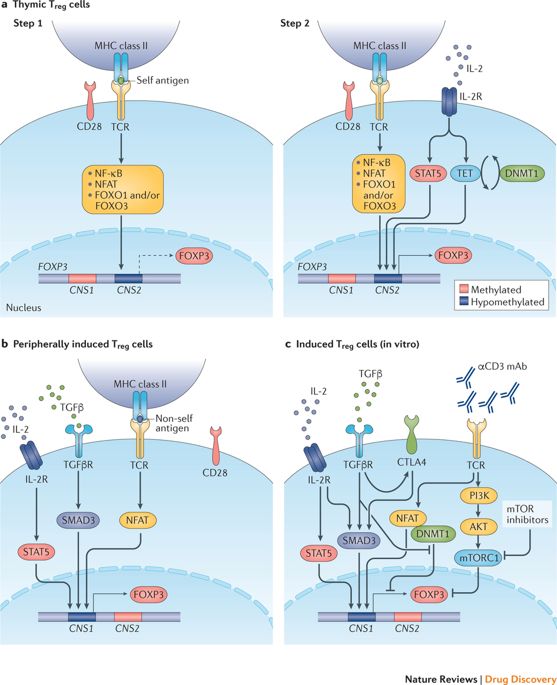Nature Reviews Drug Discovery ( IF 120.1 ) Pub Date : 2018-10-12 , DOI: 10.1038/nrd.2018.148 Amir Sharabi , Maria G. Tsokos , Ying Ding , Thomas R. Malek , David Klatzmann , George C. Tsokos

|
Regulatory T (Treg) cells suppress inflammation and regulate immune system activity. In patients with systemic or organ-specific autoimmune diseases or those receiving transplanted organs, Treg cells are compromised. Approaches to strengthen Treg cell function, either by expanding them ex vivo and reinfusing them or by increasing the number or capacity of existing Treg cells, have entered clinical trials. Unlike the situation in autoimmunity, in patients with cancer, Treg cells limit the antitumour immune response and promote angiogenesis and tumour growth. Their immunosuppressive function may, in part, explain the failure of many immunotherapies in cancer. Strategies to reduce the function and/or number of Treg cells specifically in tumour sites are being investigated to promote antitumour immunity and regression. Here, we describe the current progress in modulating Treg cells in autoimmune disorders, transplantation and cancer.
中文翻译:

调节性T细胞在疾病治疗中的作用
调节性T(T reg)细胞抑制炎症并调节免疫系统活性。在患有全身性或器官特异性自身免疫性疾病的患者或接受移植器官的患者中,T reg细胞受损。通过体外扩增T reg细胞并将其再注入或通过增加现有T reg细胞的数量或能力来增强T reg细胞功能的方法已进入临床试验。与自身免疫的情况不同,在癌症患者中,T reg细胞限制抗肿瘤免疫反应并促进血管生成和肿瘤生长。它们的免疫抑制功能可能部分解释了癌症中许多免疫疗法的失败。正在研究减少肿瘤中特定位置的T reg细胞功能和/或数量的策略,以促进抗肿瘤免疫力和消退。在这里,我们描述了在自身免疫性疾病,移植和癌症中调节T reg细胞的最新进展。




























 京公网安备 11010802027423号
京公网安备 11010802027423号